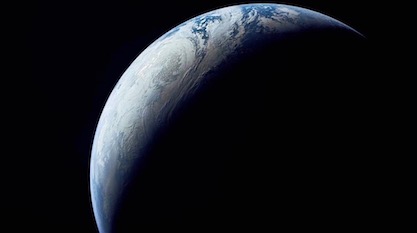 Physics, Earth & Space
Physics, Earth & Space
“Optimism” and a Lonely Planet


Writing at the NPR blog 13.7: Cosmos and Culture, astrophysicist Adam Frank (University of Rochester) interviewed fellow astrophysicist Avi Loeb (Harvard) about the future possibility of detecting “techno-signatures” from space. That is, evidence of past or currently existing alien civilizations in the cosmos: “[W]hen it comes to techno-signatures, as our technologies get better we might suddenly find lots of signals from the activity of technological civilizations.”
Of course, none has been found. But our ability to detects such signs is improving, and so, reflects Frank, “this era may well be nearing its end.”
And it may, but that is a question that has no preferred answer. So you would think. However, for the culture of materialism, whether humanity is unique or not in the universe indeed has a preferred resolution: We cannot be special.
A scientific view open to intelligent design can accommodate a universe abundant in intelligent life, or quite the opposite. In the former case, evidence of design would still have to be sought in the details of alien and terrestrial biology. If life on Earth bears positive scientific evidence of ID, that would not be refuted by the discovery of life elsewhere.
But a “special” place for life on Earth rings alarm bells for materialists. That is why popularizers like Carl Sagan have always held out against it, on the basis of no evidence at all.
Regarding the quest for ETs, what does the future hold? Frank concludes:
Loeb is essentially optimistic about the search.
“We humans are probably not special,” he said, explaining that with so many planets in the universe, the rise of civilizations may not be so usual.
But Loeb’s belief that we are “not special” takes a back seat to his scientific dedication to data.
“I give the final say to the facts,” he said. So, for Loeb, the effort now should be developing search technologies and strategies so we can just go out and look. [Emphasis added.]
It’s remarkable that some of these things need to be said, or that they’re stated at all. This is the most revealing single word I’ve seen in a while: Loeb is “optimistic” — what a candid thing to say — about finding evidence for his preferred belief that “humans are probably not special.” That’s quite an admission. Or does he merely mean that detecting techno-signatures would be exciting, as it certainly would be, and who wouldn’t enjoy that? Maybe.
Equally interesting, though, is the statement that personal preferences must “take a back seat to [Loeb’s] scientific dedication to data.” He “give[s] the final say to the facts.” You would hope so! But evidently, in the context of metaphysically freighted science, it was not obvious enough to Dr. Frank that it could go without saying.
This is one of those revealing little slips that scientists make, so revealing of the power of bias to shape thinking. It’s worth taking note.
Photo credit: “Earth as Viewed From 10,000 Miles,” November 9, 1967, from Apollo 4, by NASA.
